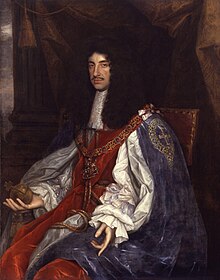Read the Story
Guess the Song
here's a clue...
Lord Rochester raised his glass. “To the king,” he toasted. “And I shall be delighted to finish the bottle in your name.”
Charles laughed. His very royal majesty, having already drunk one entire bottle, now set down his glass, stretched his legs, flicked the dark curls of his wig from his face, and said, “Drink the rest on your own, John. I’m off to spend the night with Nellie. She’ll be waiting, though probably half pissed herself.”
John Wilmot, Earl of Rochester, smiled gently. He had enough experience himself and knew just what a hard job Nell could be. Faced with an intoxicated king collapsing on his bed John called for her.


The king stood, stopped, then swaying slightly in the doorway. “I’m coming down to the races next week, John. Will you be at home? Or still in London?” His voice was blurred and the words not quite as clear as he imagined, but the earl understood.
“I’ll be at home. Elizabeth expects some level of attention when it fits in with your dear majesty’s requirements. Will you ride over? Or do you want to stay?”
“No,” the king shook his head and almost fell over. Two of the small eager puppies from one of the spaniel’s last litter, having never been trained to do anything else except love their owner, were racing around the table legs. Rochester grabbed the wine bottle standing there, saving his own Burgundy from the inevitable spill. “I’ll stay in Cheltenham,” mumbled his majesty. “But I’ll ride over for a drink and a fair lunch,” he managed to say. “And I’ll hope for your company at the racecourse naturally.”
“Naturally, your majesty,” Wilmot said, raising his glass. “Obedience is my natural response at all times. If my glass is empty, there must be a bottle to fill it. If my arms are empty, there’s a woman must fill them. And should my heart be empty, then I look for my king to fill it. But his mistress is waiting, and she’ll accept no monk, expecting the king to fill her - sweet dreams, my king.”
Although he did not continue, Charles had already heard all the verses himself some days previously, knowing full well how vulgar Wilmot’s poetry could be. Had Wilmot completed the verse, it would not have been language for a king, at least – only in private.


Once Charles had stumbled from the room, John Wilmot stood, yawned and stretched his back. Having disregarded the dregs of crimson in his own bottle, he left the room and called for a royal page. Living at court was cheap, and he paid for little, but his majesty rarely paid the salary already arranged with his courtiers, and although John served as a gentleman of the bedchamber and slept on a wedge of uncomfortable lumps, his face licked by at least half a dozen spaniels during most nights, he was rarely provided with any wages. He therefore prepared a less prestigious return to his Cotswold manor.
A hired coach, horses borrowed from the royal stables, a rug from his own court bedchamber, and a quick request made for an armed guard up front, a driver who would actually know his way, and an early start in three days’ time.
“A long journey into the countryside,” he warned them, so he needed the windows changed. They would take out the glass, which would surely break on those country roads of narrow bends, broken patches, holes and bumps, and use the usual thin wooden replacements.

John Wilmot wandered over to the theatre that night, and enjoyed the usual heroine, skirt tossed up to her knees as she danced with the young man gowned and hatted as a wolf out to capture a lamb. He took his own bottle of deep red wine with him, enjoying the smell of it even before he drank it. Shakespeare was somewhat out of fashion these days although replaced too often by something shoddy. But returning to court afterwards, it was his own theatrical play he was working on, neither vulgar nor full of fairies, but a satire on the behaviour of man.
He was, of course, one of the same, amongst the men he satirised. He sometimes held himself superior. But rarely. Mankind had, he supposed, been one of God’s greatest mistakes. Not that he believed in God.
Charles II, being ostensibly Protestant, held the country together with its panic-ridden religion, yet Wilmot knew well that secretly Charles believed in Catholicism, and despised the strict puritanism of true protestants, loathing them for the hypocrisy and for having murdered his father. John Wilmot disregarded them all. John, invariably bored unless writing, had found two women to match his wit and insight, and had married one of them. He was yet to find any gentleman who might impress him as much.

He had retired at first to the small shelter in the royal grounds, given to him by the king some months earlier, for his study of the new sciences, and his exploration of those new beliefs respected by men such as Newton, and described as alchemy, but not as magically wishful as the old alchemists had evidently adopted. Then a page came running, out of breath, telling him he was wanted in the grounds, by a lady sitting on the long garden bench watching the small water fountain, and the lake beyond it. John Wilmot was quite sure he knew who this was, and wandered out into the sunshine.
The lady, now titled and yet still known as Nellie, sat beneath her wide-brimmed hat, and smiled as Rochester wandered up. She was indeed the other female he counted as well-nigh intelligent and witty as himself. Her eyes sparkled and she was as pretty as always, yet she looked tired. Rochester mock-bowed.
“My dear Nellie, tell me the worst.” He sat beside her, stretched his legs, and leaned back into the sunshine, his frizz of pale curls showing its knots as the wig tipped back a little beneath his hat. He crossed his arms and smiled. Known as one of the most attractive men in all England, he made little attempt to look as gorgeous as he could. Besides, he had virtually no money.
Nell basked in money and was also beautiful. “He’s tired of me,” she said, half mumbled. “Either that or he’s tired of everything except drinking. Johnny, show me how you tempt a man who’s pissed and can’t get up?”
Rochester was laughing. “Sing the poor soul to sleep,” he recommended. “He’ll never remember his failure in the morning. Not if you describe how valiant and upstanding he was. If you can’t bring him contentment at night, bring it as he wakes. No man celebrates his failures.”
Rochester was laughing. “Sing the poor soul to sleep,” he recommended. “He’ll never remember his failure in the morning. Not if you describe how valiant and upstanding he was. If you can’t bring him contentment at night, bring it as he wakes. No man celebrates his failures.”
“You could show me. Or at least, tell me.”
Rochester shook his head. “Oh, my dear, the delights of imagination! Yet stealing the king’s mistress surely conjures few sweet memories upon the gibbet. If the sweet boy passes you over, then I might smuggle you home since I know my wife would adore you. But Charles is mindful of his pride and struggles to stretch his store of humour.”
“I discovered that,” Nell sighed. “At least with you, sweet Johnnie, we can laugh together even if little else.”
“Tell your sweet Charlie that he is magnificent. Applaud his staying power, his noble manliness and his bedtime skills, so even if the wretched man fell deeply asleep as soon as his wig touched the pillows, the following morning he will, through your descriptions, begin to remember the wild and exotic pleasures of what in fact he had never done.”
“And what will he do if he knows I am lying?”
“He will laugh,” Rochester told her, “because his pride will not allow him to refute what he’ll assume was your imaginative pleasure.”


The other great ladies who shared the king’s bed on frequent occasions, were not friends with the second Earl of Rochester. The king was careful to set his pride on a plinth since he considered that his duty, even in a country he resented for having murdered his father. The two whores who played mistress to the king’s master, were conscious of their pride since they had both grown up without the slightest respect from others, and so now insisted on it in waves. They resented Rochester, for he ridiculed them and everything else, including himself and their king too, and shook their attempts at pride to the cobbled pavements.
Rochester did not care in the least, except when his wit overflowed his common sense, and some mistress would be told, and complain to the king.
“Oh, John, again?” his majesty would yawn. “Must I exile you from court yet again?”
“No matter,” John Wilmot would smile and say, “Exile is a rescue from the tedious stupidity of England’s upper classes. I shall return to the country, kiss my wife, and read Cicero, Shakespeare and Cato.”
“And I shall see you when I come down to Cheltenham for the races,’ the king would add, turning away.
Another carriage home with borrowed horses, a hired guard and a hired carriage with less padding and more strange smells inside.
The reign of Charles II and the bluster of the late 17th century brought little to England except the slow but careful annihilation of puritanism, the dogged belief in a God so intolerant that music and dancing were considered wicked, that the Catholic Church was a heathen institution, and that even prettily coloured clothes would awaken God’s wrath. The king and his lords, many of them having previously been exiled to France, or had escaped there during the civil war, including the heir to the throne himself, tumbled back into England with the determination and long practise of absolute indulgence. Brothels abounded, women reappeared on the stage, but welcomed the male audience into their arms once the theatrical production had ended, and sexual proclivity was so fashionable it became virtually obligatory.
“Everything, except impotence,” sighed John Wilmot of Rochester, “is now all the rage in our sweet country, including sex with perfect strangers while on the way down the road to meet your mother or wife. And so we drink, either to initiate the greater downfall of society, or to numb the knowledge of our own stupidity. Burgundy is a religion without heretics.”

© Barbara Gaskell Denvil

© Barbara Gaskell Denvil
Did you guess the song title?
LITTLE OLE' WINE DRINKER ME by DEAN MARTIN
LITTLE OLE' WINE DRINKER ME by DEAN MARTIN

Leave a comment below...
like... share...
#DDRevsStorySong

Thank you!
There will be another story inspired by a song tomorrow!
< Previous story ... Next story >
The Full List of Authors
December
4th Helen Hollick Promises, Promises
5th Paul Marriner Memories
6th Pam Webber One Door Closing
8th Barbara Gaskell Denvil Sticks and Stones
9th Judith Arnopp Secrets
10th Erica Lainé Silk Stockings
11th Anna Belfrage Hold Me, Love Me, Leave Me?
12th Annie Whitehead Frozen
13th Tony Riches Alas, My Love
14th Clare Flynn, Zipless
15th J.G. Harlond The Last Assignment
16th Elizabeth St John Under The Clock
17th Alison Morton Honoria’s Battle
18th Jean Gill The Hunter
19th Patricia Bracewell Daddy's Gift
20th Debbie Young It Doesn't Feel Like Christmas
21st
23rd Elizabeth Chadwick The Cloak
24th / 25th (Christmas Break)
27th Barbara Gaskell Denvil Just The One... Or Maybe Two
28th Deborah Swift Just Another Day
30th Cryssa Bazos River Mud
31st HAPPY NEW YEAR
Note: There is copyright legislation for song lyrics
but no copyright in names, titles or ideas







Great song for a man who knew how to party :) Rochester is such a complex character and I like complex. Packs a lot into a short story and what a fascinating time! I like the take on 'Nellie' who has been ill-served by children's history books.
ReplyDeleteTotally agree about Nellie - it's about time we (us fictional writers) brought her _properly_ to the fore!
DeleteOh, I loved this, Barbara! Showing our Merry Monarch as he most probably was. Adored the line '...tumbled back into England ....'And poor Nell - Helen is right, she deserves better ....
ReplyDeleteNo, didn't get the song, but brought back memories of when singers could not only sing, but could perform the song without either theatrics or blandness. Wonderful, will be singing the chorus all day - thank you!
Sinatra, Dean Martin, Bing Crosby ... I guess I shouldn't own up to being able to instantly identify their voices but alas, I am that old! *laugh*
DeleteI'd guessed it was UB40 Red Red Wine! Lovely stuff, and delightful to see wicked Wilmot as something other than a wastrel and a sot.
ReplyDeleteI agree Mel - it was good to see Wilmot's other side!
DeleteYes I thought it was Red Red WIne too
DeleteHaving just spent a couple of years with Wilmot's mother, I do very much appreciate your sympathetic view of him. He was just a difficult boy! Loved the story, and Nell's role. Very fun. I went with Bob Marley's Red Red Wine, so close!
ReplyDeleteA neat side story to Nell's own history! And Rochester - what a bright, witty, brittle intellect and rampant sexual adventurer. The post 1660 period must have been such a bizarre contrast to the previous regime. Thank you, Barbara, for this glimpse.
ReplyDeleteThanks so much everyone for your comments - your lovely words (Richard, you are such a brilliant author yourself, so your kind words bring in the sunshine) of interest are very special to me. Thanks so much. I'm sorry to come a little late - I am a wandering homesless vagabond myself at present living out of a suitcase and won't settle until mid 2020 so I don not always have a working computer. But Wilmot and Nelly both have ridiculous reputations which are completely undeserved - and I loved writing just a tiny piece of the truth. Thanks again
ReplyDelete